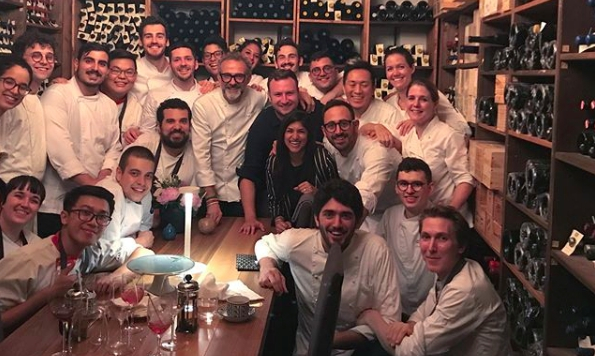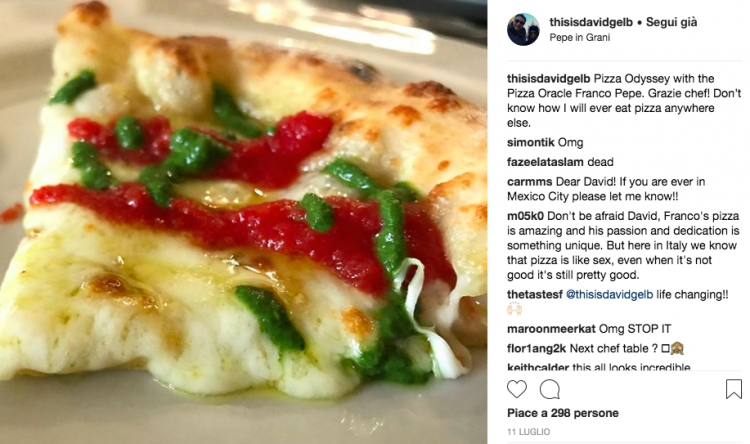One of the most interesting guests at the Basque Culinary World Prize, the event organised a couple of weeks ago in Modena by the Basque Culinary Center, Massimo Bottura and Lara Gilmore, was AmericanDavid Gelb.
Born less than 35 years ago in New York, now based in Los Angeles, this shy guy has a cv that would make even his more experienced colleagues envious: in 2011 he was the author and director of Jiro Dreams of Sushi, perhaps the most viewed food-documentary in the world. Today he’s the executive producer of Chef’s Table, the popular Netflix series with dozens of millions of viewers. The episodes have had a striking impact on the fame of the chefs participating in the documentaries.
«I travel a lot, eat incredible specialties, and meet fantastic people: I’m very lucky», he whispered modestly a while earlier, on the stage of Collegio San Carlo in Modena. We met him and had a little chat with him.
You’re here for a panel titled “Transforming society through gastronomy”. Is it a realistic goal?
Yes it is, because we eat multiple times each day. Food is a part of everyone’s life. Chefs are admired and acknowledged. If they tell us how to eat, we must listen to them. They have a great influence, they have special powers.

David Gelb with the staff from Osteria Francescana (photo instagram)
Yes. The starting point at Chef's Table is to consider each chef as a superior being: this is the premise behind each episode. We try to understand how they see things in a way others don’t. We want to understand everything about their origins, find out how they found that voice, and how they learnt to use it in the right way.
Did you expect such a success?
No. It exceeded all my expectations. It was my hope, my dream.
You’ve filmed dozens of documentaries. Who is the chef with the best screen presence?
Argentinian Francis Mallman, he’s phenomenal. He had already been on television plenty of times in South America, he knows how it works. Poetry, attention the clothes, spaces. He was born for the screen. Everything he does is pure cinema.
Who was the hardest to work with?
You’re putting me in a difficult position. Let’s say they all have their style. Our initial approach is to be as humble and revering as possible: if we do so, if we leave the chef the possibility to lead the dance, then things work better, they are more natural, more agile.

An enthusiastic post by David Gelb on Franco Pepe’s pizza (photo instagram)
Let’s say it was hard at first with
Michel Troigros. When he realised we were to stay two weeks, his reaction wasn’t good: ‘why so long?’ So we decided to give credit to his sons. His first born
César knew the series well. It took us a while to convince his father, but then he was very helpful. Like all his colleagues.
The documentary on Troigros was part of a series on France. Massimo Bottura was the first chef, and a few weeks ago the episode with Corrado Assenza went online. Will you ever do a series on Italy?
For sure, your country would deserve a show by itself. I dined in fantastic restaurants, run by chefs with great point of views, armed with beautiful stories. There are endless valid candidates in Italy, choosing would be very hard. We must also consider that Netflix has a global audience. We cannot be too local. But I’d like to dedicate more space to Italy for sure.
Who are the chefs to be included in the next season?
I cannot mention any name. But I can say we will cover both high-end chefs and others who are less known, and run much smaller restaurants. As for the choice of subjects, the other executive producer Brian McGinn and I try to cover as much diversity as possible in terms of race, gender, and now of type of restaurant too. Every season we must try to show as large a range as possible, with all its contrasts.

A last goodbye to the late Jonathan Gold, third from the left (photo from instagram)
We’re working on casting and script for a special plot. It’s a true story, slightly adapted for our public. When he was 30, my father
Peter [the current general manager of the Metropolitan Opera in New York City] became the manager of
Vladimir Horowitz. American of Ukrainian/Soviet origins, he was one of the greatest pianist of all times. He was in his eighties at the time, and had mental health issues so people believed his career was over. My father pushed him to continue after he retired. They did a world tour that included Russia, where he hadn’t been for 60 years. It’s the story of a strong relationship, in the days of Reagan and the KGB.
Did you know Jonathan Gold, the great Californian journalist who passed away a few days ago?
Very well, we met many times. I’m from New York and when I moved to Los Angeles I felt lost: I knew nothing, I was surrounded by endless shopping malls. Jonathan took me to places where I had never been, places I would have never found if it wasn’t for him. He shaped the city. He was a guiding light, his writing was beautiful. It’s a huge loss, for me and for everyone.
See also
Bittor Oroz: we can transform society through gastronomy
Tutte le idee del simposio di Modena
Jock Zonfrillo wins the third edition of the Basque Culinary World Prize
Corrado Assenza: my days with the troup of Netflix